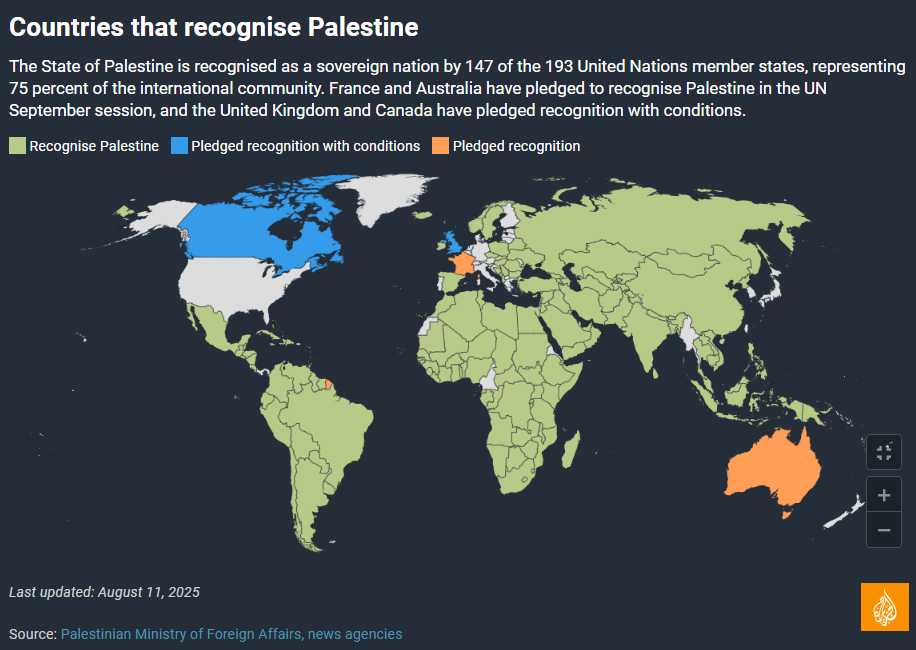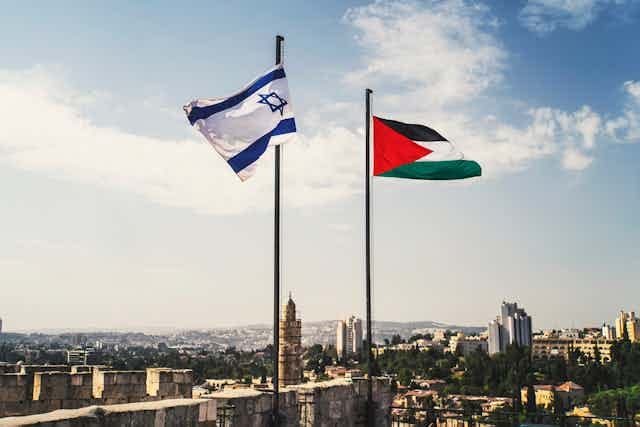Recognition Without Statehood: The Palestinian Paradox
What Recognition Means for Palestinians?
Several key Western countries—including France, Britain, Canada, and Australia—have recently announced plans to recognize Palestine as a state, joining more than 140 nations that have already done so. But what does this recognition actually mean for Palestinians? Will it bring them any closer to achieving a sovereign state, or will it remain symbolic? And how will such recognition play out on the ground, amid ongoing conflict and occupation?
Recognition Isn’t Statehood
The recent wave of recognition of Palestine by Western countries may appear historic, but recognition alone does not create a state. In international law, statehood is not just a matter of diplomatic acknowledgment; it requires sovereignty, defined borders, functioning institutions, and, crucially, the political will of the international community to enforce it.
Without a decision by the UN Security Council that sets out a binding framework and a clear pathway toward implementation, recognition remains symbolic. Over 140 countries already recognize Palestine, yet the daily reality for Palestinians remains occupation, settlement expansion, and fragmentation of their territory.
The United States’ role is decisive. Washington has repeatedly vetoed UN Security Council resolutions that could give practical meaning to recognition, whether through concrete timelines, monitoring mechanisms, or consequences for non-implementation. As long as the U.S. maintains this protective shield for Israel, recognition by individual countries—whether France, Britain, or others—cannot compel Israel to alter its policies.
What Palestinians need is not more symbolic gestures but a structured international commitment with enforceable consequences. Without that, recognition remains a political statement rather than a step toward actual statehood.
Shift in Global Public Opinion
While recognition on its own does not deliver Palestinian statehood, it undeniably signals a shift in global public opinion. What was once a marginal position—limited to the Global South or countries outside the Western bloc—is now gaining traction in the very capitals that Palestinians have long accused of enabling Israel’s policies.
This growing recognition reflects mounting pressure on Western governments to respond to what many increasingly view as an unfolding catastrophe for Palestinians. The images from Gaza, the humanitarian crisis, and continued settlement expansion in the West Bank have moved public opinion, particularly among younger generations, civil society groups, and human rights organizations. Western governments can no longer ignore this sentiment without facing domestic political costs.
Recognition creates an accumulation effect: each new government joining the list of 140+ countries adds weight to the Palestinian cause and normalizes the demand for statehood as a legitimate international issue, not a fringe aspiration. If this trend continues—and if Palestinian political forces, together with Arab states, can strategically harness it—it has the potential to significantly strengthen Palestinians’ standing on the global stage.
Coupled with the growing legal pressure at the International Court of Justice (ICJ) and political pressure from various countries and institutions, this shift could eventually narrow Israel’s room for maneuver. Over time, it may help force Israeli leaders to engage more seriously with a genuine solution, rather than indefinitely managing the conflict.
Recognition, then, is not the end of the road but the signpost of a changing climate—a moral and political accumulation that could, if used wisely, build momentum toward meaningful change.
Beyond Symbolism: Real Policy Needed
Recognition without action risks being little more than a diplomatic gesture. If Western countries truly intend to advance Palestinian statehood, they must translate words into binding policies that alter realities on the ground and challenge Israel’s decades-long strategy of blocking a Palestinian state.
1. Sanctions with Teeth, Not Empty Statements
Israel has faced little to no cost for deepening the occupation. Western governments must change that by halting the export of weapons, dual-use technologies, and surveillance tools that sustain the occupation. They should suspend cooperation in major security programs, research projects, and large-scale economic ventures until Israel complies with international law.
Targeted sanctions should extend to institutions and individuals driving current policies: the IDF for actions in Gaza and the West Bank, extremist cabinet ministers who openly call for annexation, and even Prime Minister Netanyahu himself. Without real consequences, Israel will continue to ignore international opinion.
2. Strengthening Palestinian Diplomatic Status
Recognition should be followed by opening full embassies for the Palestinian Authority, not merely symbolic missions. Western states must back Palestinian membership in international organizations, vote for them in the UN and other global forums, and create diplomatic space where Palestinians can exercise real agency on the world stage.
3. Backing Palestinian Unity and Democracy
Israel has often exploited Palestinian political divisions to undermine statehood. Western countries, together with Arab partners, should invest in helping moderate Palestinian forces unite, hold credible elections, and build functioning democratic institutions. A representative Palestinian leadership would both empower Palestinians and undercut Israel’s argument that there is “no partner for peace.”
4. Empowering Israeli Anti-War Civil Society
A critical avenue for influencing Israeli policy is strengthening the voices of Israeli civil society organizations that oppose war and advocate for Palestinian statehood. By providing support—through funding, international partnerships, capacity-building, and media amplification—these groups can increase domestic pressure on the current extreme government. Highlighting and legitimizing moderate Israeli voices helps shift public discourse, exposing the political and economic costs of hardline policies. As grassroots movements gain visibility and influence, they can erode the political support sustaining extremist leadership, potentially creating conditions for the government to collapse or be replaced by a more moderate administration committed to diplomacy and peace.
5. An International Alliance for Statehood
Finally, recognition must be institutionalized through an international alliance for Palestinian statehood, ideally based in a European capital such as Paris, Berlin, or Brussels. This alliance would meet regularly, coordinate sanctions and diplomatic initiatives, and ensure recognition translates into sustained action.
Conclusion: Breaking U.S. Exceptionalism
None of this will succeed without addressing the elephant in the room: the United States. Washington has repeatedly shielded Israel from accountability—vetoing UN Security Council resolutions, blocking sanctions, and undermining international law. If Europe, Canada, and others continue deferring to U.S. obstruction, recognition will remain symbolic. But if they act independently—aligning with the 140+ countries that already recognize Palestine—they could reshape the balance and put unprecedented pressure on Israel.



